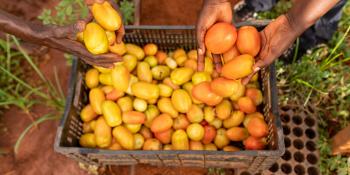
Here at VSO, we have a team that operates across the world. As part of our Life at VSO LinkedIn article series, we aim to give you an insight into what life is like working at the world’s leading international development organisation. In this edition, we speak to Purna Shrestha. Purna is a Lead Advisor for Education located in the UK with a journey that first started with us in 2004.
What is the purpose of your role and what are your focuses?
I am a Lead Advisor for Education at VSO where I am responsible for bringing in external and internal evidence to assist the development and design of our inclusive education programmes. A key part of my role is making sure that we are always following the core values of the organisation when we design, deliver and monitor these programmes for our primary actors. This gives us confidence that we’re always empowering the most marginalised people to take charge of their own development!
This often includes building collaborative partnerships that promote innovative growth, impact, and inclusion. It’s our job to make sure that we stand beside and advocate for those who have been denied choice and opportunity while encouraging different and inquisitive perspectives.
On top of this, my role also includes fostering collaboration among volunteers, staff, and partners. This is to generate collective wisdom using learning and evidence as well as insight to guide our actions. As a result, this knowledge helps us implement innovations around Volunteering for Development in education programmes.
I also provide technical support and coach technical advisors, VSO staff, and volunteers who work in the field across our many global projects. It’s all very exciting to be part of!
How did you get to where you are now?
It’s been a very interesting journey so far! I first came to learn about VSO when a group of volunteers came to live in my village in Nepal in 1996. At that time, part of their language and cultural induction before they started their placement would include spending three weeks with local host families.
I was a young teacher and the headteacher of a local primary school which I founded in 1990. I was curious to learn from VSO volunteers and in exchange helped them learn about Nepali culture. Some of those VSO volunteers have actually become lifelong friends that I still speak to today!
The volunteers worked in near districts and I remained in touch with them. I requested a VSO volunteer to help with the Nepal English Language Teachers’ Association (NELTA) of Makawanpur district at the time (I was the secretary of NELTA Makawanpur). VSO did provide an English Language Teacher Trainer but we could not secure the funding to hire a full-time counterpart teacher trainer to work alongside her. I decided to take on this position full time on a voluntary basis which lasted two years and definitely helped me develop my confidence in my own teaching skills!
I later moved to Kathmandu which is the capital city of Nepal. Here I was pursuing my master’s degree in education. While I was at the university, I used to work as a Translation Consultant for VSO Nepal so as you can imagine, I had a very busy schedule! After my studies finished, I worked for the US Peace Corps as a language teacher and worked as a freelance consultant for various NGOs and research projects. From here I joined Room to Read and led a local language publication project.
I later joined VSO as a Research Consultant to conduct participatory research on teachers’ motivation for six months. Once I completed the report, VSO asked me to develop advocacy strategies based on the findings of the report. As I continued working as a consultant for VSO, there was a vacancy at VSO Nepal which I applied for. However, I was not successful. I was disappointed by the result but I asked for feedback on my interview and continued to work on the skills that I was weak at. Finally in 2005, I joined VSO as a staff member. I worked as an Education Programme Coordinator for two years and later as Education Programme Manager until 2008!
Even though I was working in Nepal, I closely worked with Global Technical Advisors and always proactively shared my skills with other colleagues. This particularly included my research and advocacy skills, and my role in building the capacity of local civil society organisations, to hold the duty bearers accountable.
I was also a co-chair of the education working group of the Association of International Non-Governmental Organisations.
I eventually moved to the UK to take up the Global Research and Advocacy Advisor to lead VSO’s Valuing Teachers research in 2009. Coming from the south and having first-hand experience of poverty and the impact VSO had on my professional career, I continued work as a Global Technical Leader for VSO. Since 2014, I have been working as a Global Technical Advisor.
What does your average day look like?
Just like the weather in the UK, none of my days are the same. VSO is a global organisation that adapts dispersed leadership. My colleagues are based across the world with different time zones! I wake up early and start my day with yoga and meditation most of the time. I have two young children and I share our parental responsibilities with my wife who also works full time.
I used to travel to country offices and visit volunteers and parents in action. However, I have been working from home since the COVID-19 pandemic started in 2020.
Outside of VSO work, I spend a lot of time with the community charity Early Years Education Society UK which I set up with my friends in 2017. We run extra-curricular activities such as outdoor hiking and Nepali language classes. Education is definitely key!
Alongside this, I’ve hosted weekly online music programmes for the local community in 2020. I’ve also organised five episodes of international cultural and music forums! More than 100 children from Asia, Africa, and Latin America joined the online forum and shared their talents – it was really inspiring to see!
I also spend my weekends offering pro bono teachers training and youth mentoring sessions.
What is one thing that you enjoy most about working at VSO?
One thing that I like about my role is that I get to think creatively, design innovative solutions, and after a few years see the result of my work. For example, Rohingya people were displaced from Myanmar, I witnessed thousands of young children not having access to education. To combat this, I designed a home-based early childhood education programme in a Rohingya camp. Now, we have replicated that home-based early childhood education in host communities. I first introduced the concept of remote volunteering three years ago as a pilot project and I am glad that more than a hundred volunteers are offering their services remotely now.
What is different about working from home?
I mostly interact with colleagues who are based in different countries, therefore, I have not felt any massive differences and I used to work from home three days a week before COVID-19. As a parent, this has been a blessing as I could do the school run and spend my community time with my children and family. However, I do miss meeting colleagues in the office and around the world!
What makes VSO different from other organisations?
People often ask me how I could work for an organisation for more than 15 years, but it’s simple. VSO offers flexible working and its values matter the most. We harness the power of volunteers and help marginalised people to take action themselves. We are a global organisation, however, we do not impose one size fit all approach in our solution designs. Our solutions are informed by local contexts and assets that communities/countries have. For instance, when we designed the Building Learning Foundation project in Rwanda five years ago, we mobilised a large number of national volunteers to become learning facilitators.
At that time, we were not sure whether we could recruit national volunteers who have positive attitudes and the skills to work along with international volunteers.
When I visited our project in December 2021, I was so delighted to see that out of 30 district Education Advisor roles, 20 roles were taken by the national volunteers. The experience of the volunteer who is doing the international volunteer’s role is similar to my own experience and professional career journey. When you get the opportunity to work with people from different countries together, you widen your thinking, learn to see problems from different perspectives.
Read more

Kenyan beef pilau recipe
In this blog, some of our VSO family share their favourite mouth-watering recipes and highlight the work they’re doing to promote sustainable farming practices and healthy eating. Here is a recipe for Kenyan beef pilau from volunteer Fridah.

Bangladeshi tomato bhorta recipe
In this blog, some of our VSO family share their favourite mouth-watering recipes and highlight the work they’re doing to promote sustainable farming practices and healthy eating. Here is the Bangladeshi tomato bhorta inspired by Maleka’s vegetable garden.

Pakistani chicken biryani recipe
In this blog, some of our VSO family share their favourite mouth-watering recipes and highlight the work they’re doing to promote sustainable farming practices and healthy eating. Here is Pakistani chicken biryani from volunteer Khajida.
